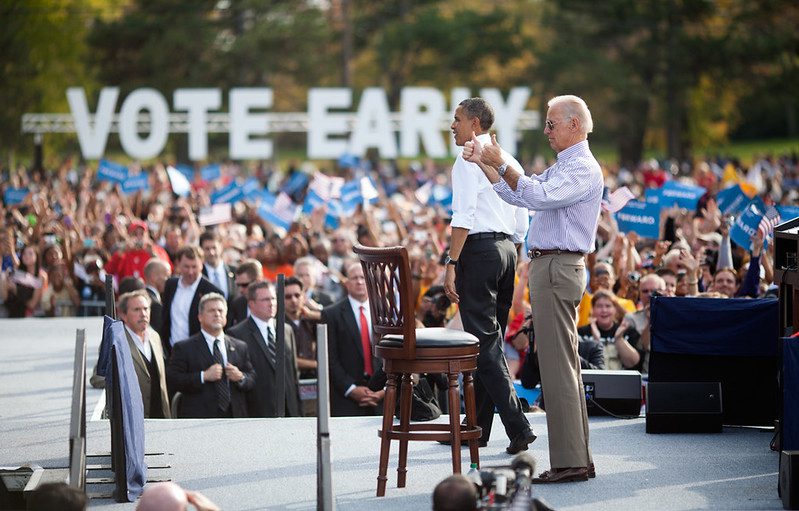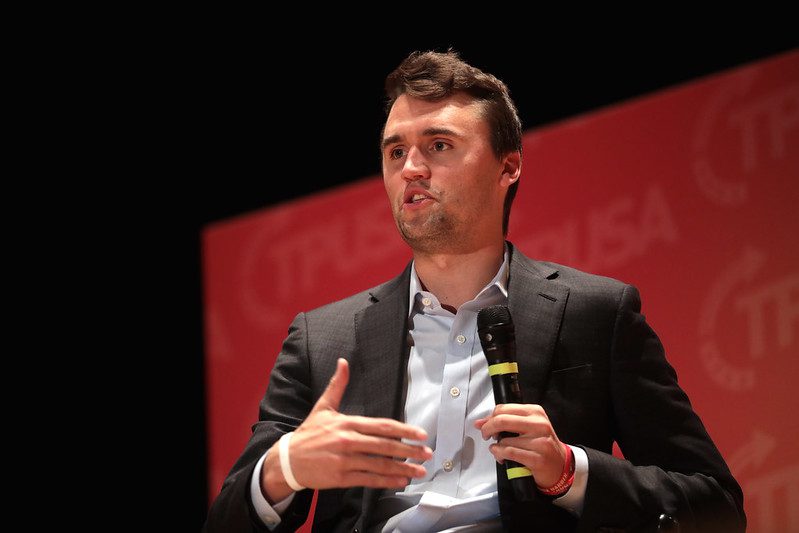Charlie Kirk’s assassination on Wednesday August 10th has, paradoxically, united and divided America’s warring political tribes.
Republican leader Donald Trump, the 45th and 47th President of the United States, echoed this sentiment in a televised speech from the White House, calling the nation “united in shock and horror” and the assassination; a “terrorist attack”. The 46th and 44th presidents, Joe Biden and Barack Obama, both politically opposed to Donald Trump and the Republican sweetheart Charlie Kirk, shared joint condolences, characterising the event as “despicable violence with no place in democracy or America”.

Image: Former Presidents Joe Biden and Barack Obama – Mike Brophy
Sentiments from the Republican and Democratic camps in Washington share a clear message; political violence and the destruction of free speech have no place in America. And with much of the nation’s political elite, including former Democratic political figures, expected to attend the funeral of Kirk, the nation’s rift between the red and blue flags may quieten briefly.
But away from the avenues and embassies of Washington DC, unity between the left and right among the public remains elusive.
Charlie Kirk’s rise was as swift as it was deliberate. From a suburban upbringing in Illinois, he founded Turning Point USA in 2012 as a student-led, ‘GreenGrass’ movement to “challenge leftist orthodoxy” on American campuses. What began with a handful of activists under Kirk, handing out flyers on the Harper College campus in Chicago, grew into a nationwide organisation with a multimillion-dollar budget.
Bankrolled by conservative donors eager to cultivate the next generation of Republican firebrands, the movement had amassed over 10 million followers across major social media platforms by the time of Kirk’s death.
Kirk’s genius lay in framing cultural grievances as rallying cries for youth politics. His conferences and media appearances attracted thousands of students who saw in him not just an activist, but a mentor. By Trump’s first term as President, he had become more than a campus provocateur: he was the Republican sweetheart, Trump’s self-appointed youth ambassador, and the loudest cheerleader of a conservative America that prided itself on pugnacity.
His infamous YouTube videos, challenging America’s college liberals and left-wing supporters to debates on campuses across the country garnered in millions of views, and cemented Kirk as a hero of Trumpism in the Gen-Z narrative.
Critics accused Kirk of inflaming division, while supporters hailed him as the future of the movement. Either way, his imprint on the party’s grassroots was unmistakable, and his voice defined the conservative imagination for a generation still finding its place.
Looking back at the last eighteen months, the rift between left-wing and right-wing followings and commentary in America had already become dangerous and bloody before Wednesday. Campus encampments, street counter-protests and daily online feuding turned culture-war grievance into public spectacle: pro-Palestine and counter-protest clashes on dozens of campuses, viral confrontations between activists and students, and an accelerating stream of doxxing, threats and mob-style shaming that normalised real-world confrontation.
Back in June, Democratic politician and Minnesota representative, Melissa Hortman, was gunned down in her home alongside her husband. The shooter, Vance Boelter had previously expressed far right sympathies on social media and allegiance to the Republican Party. Boelter’s ‘hit list’ of 45 Democratic figureheads was foiled by FBI agents after the political assassination of Ms Hortman. While this type of political violence is rare, the assassinations of both Charlie Kirk and Melissa Hortman reveal that violent measures against political opponents are becoming viable options for some in America.

Image: Protester at the No Kings protest in St. Paul, Minnesota on June 14th, 2025. Holding up a sign that reads “In Honor Of Our Beloved Melissa” – Chad Davis
Kirk’s killing has been fuel to the fire. Within hours, conspiracy claims and revenge fantasies proliferated in MAGA spaces; commentators warned that the moment could be used to recruit and radicalise, turning outrage into organised action. At the same time, more permissive online subcultures cheered or minimised the violence, amplifying fear across communities. Experts say this pattern of online amplification followed by on-the-ground confrontation is a now-familiar pathway from rhetoric to risk.
Turning Point’s machinery was built for more than rallies. From its “Professor Watchlist” to its aggressive campus campaigns, the organisation framed ordinary grievances, lectures, curricula, student protests, as existential threats to a besieged conservative identity. What started as campus activism became a multimillion-dollar operation: in 2024, The Guardian reported Turning Point Action was pouring resources into swing states while amplifying election-fraud narratives, Christian nationalist themes and anti-immigrant tropes.
An investigation by The Washington Post traced coordinated networks of pro-Trump content back to firms hired by Turning Point Action, producing inauthentic accounts and nearly identical talking points across Facebook, Instagram and Twitter. The tactic worked: audiences hardened, and the jump from insult to justification became shorter with every cycle of viral outrage.
After Kirk’s assassination, the Anti-Defamation League recorded more than 10,000 posts in the first 48 hours tying his death to conspiracies about Israel and Jewish organisations, a reminder of how rapidly grief and anger can be weaponised online. What Turning Point helped to build was not just a youth movement, but an ecosystem where political identity blurred into permanent combat, and where tragedy, almost instantly, became fodder for mobilisation.
Kirk’s assassination does not stand alone in its consequences. Only weeks earlier, the killing of Iryna Zaretska, a Ukrainian refugee stabbed to death in August, had already sharpened the sense of vulnerability among immigrant and minority communities. Where the right framed her death as evidence of a broken state unable to protect its borders, many on the left saw it as yet another symptom of a climate poisoned by xenophobia. Now, with Kirk’s murder layered onto this atmosphere, both sides carry fresh grievances.
For conservatives, Kirk will be elevated as a martyr of free speech; for progressives, the violence affirms their warnings about rising extremism. America’s political centre, so briefly visible in the unity of official condolences, is already dissolving. What remains is a nation simmering ever closer to overspill; a hotpot of grief, anger and suspicion.
Featured Image via Gage Skidmore

